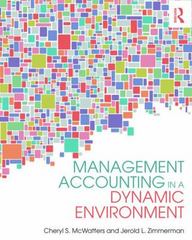Question
1) In calculating the amortization of a leased asset, the lessee should subtract a/an Select one: a. guaranteed residual value and amortize over the life
1) In calculating the amortization of a leased asset, the lessee should subtract a/an
Select one:
a.
guaranteed residual value and amortize over the life of the asset.
b.
unguaranteed residual value and amortize over the life of the asset.
c.
guaranteed residual value and amortize over the term of the lease.
d.
unguaranteed residual value and amortize over the term of the lease.
e.
None of the above. unguaranteed residual value and amortize over the term of the lease.
2) On January 1, 2020, Metal Corp., the lessee, enters into an agreement with Plough Rentalz Inc., to lease a machine from them. Both corporations adhere to ASPE. The following data relate to the agreement:
1. The term of the non-cancellable lease is three years with no renewal option. Payments of $ 543,244 are due on December 31 of each year.
2. The fair value of the machine on January 1, 2020, is $ 1,400,000. The machine has a remaining economic life of 10 years, with no residual value. The machine reverts to the lessor upon the termination of the lease.
3. Metal depreciates all its machinery on a straight-line basis.
4. Metal's incremental borrowing rate is 10%. Metal does not have knowledge of the 8% implicit rate used by Plough.
5. Immediately after signing the lease, Plough discovers that Metal is the defendant in a lawsuit that is sufficiently material to make collectibility of future lease payments doubtful.
From Metal's viewpoint, what type of lease is this?
Select one:
a.
finance lease.
b.
manufacturer or dealer lease.
c.
operating lease.
d.
other finance lease.
e.
Buy back lease.
3) A deferred tax asset exists when
Select one:
a.
the book basis of assets is greater than the tax basis of assets.
b.
the book basis of liabilities is greater than the tax basis of liabilities.
c.
the book basis of assets is equal to the tax basis of assets.
d.
the book basis of liabilities is less than the tax basis of liabilities.
e.
the book basis of assets is zero and the company reports an accounting loss on its income statement.
4) A deferred tax liability is created when
Select one:
a.
the book basis of assets is greater than the tax basis of assets.
b.
the book basis of liabilities is greater than the tax basis of liabilities.
c.
the book basis of assets is equal to the tax basis of assets.
d.
the book basis of assets is less than the tax basis of liabilities.
e.
None of the above
Step by Step Solution
There are 3 Steps involved in it
Step: 1

Get Instant Access to Expert-Tailored Solutions
See step-by-step solutions with expert insights and AI powered tools for academic success
Step: 2

Step: 3

Ace Your Homework with AI
Get the answers you need in no time with our AI-driven, step-by-step assistance
Get Started


